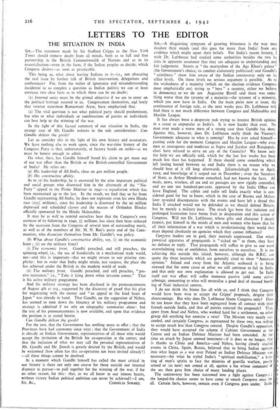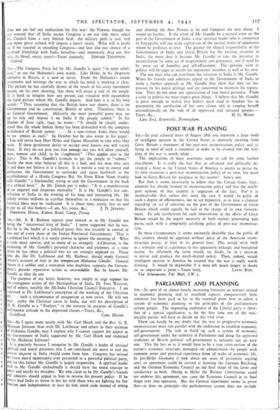Snt,—A disquieting symptom of growing bitterness is the way men
insulate their minds (and this goes for more than India) from any Snt,—A disquieting symptom of growing bitterness is the way men insulate their minds (and this goes for more than India) from any evidence which might upset their beliefs. For India's recent history, I wish Dr. Lofthouse had studied some authorities besides the two he cites in apparent assurance that they are adequate to understanding and fair judgement. Sneers at " the martyrdom of the Aga Khan's palace" (the Government's choice, its comfort elaborately publicised) and Gandhi's saintliness " show him aware of the Indian controversy only on its sillier levels. On those levels no serious argument is possible. As to the wickedness of a majority (which on the election evidence Congress most emphatically are) trying to " boss " a country, either we believe in democracy or we do not. Augustine Birrell said there was some- thing worse than the tyranny of a majority—the tyranny of a minority, which you now have in India. On the main point now at issue, the continuance of foreign rule, as the next weeks pass Dr. Lofthouse will find there is not much difference between Congress and Mahasabha and Muslim League.
It has always been a desperate task trying to interest British opinion in a cause as unpopular as India's. It is now harder than ever. No man ever made a worse mess of a strong case than Gandhi has done. Against this, however, does Dr. Lofthouse really think the Viceroy's Government adequate to what is coming? Has he ever asked himself— putting aside for the moment Congress and Muslim League—why even men as courageous and moderate as Sapru and Jayakar and Rajagopala- chari have refused to serve on any of the Councils? We know only the little we are officially told, which for the last few weeks has been much less than has happened. If there should come something which left lasting hatred between us and India there is no reason why we should hear of it till long afterwards. Jalianwalabagh was in April, 1919, and knowledge of it seeped out in December ; even the Secretary of State, as Arthur Henderson remarked, had not known the facts. All mails, news, wireless, all sea and air passages are now rigidly controlled. and no one not hundred-per-cent. approved by the India Office can leave England. The cables and radio tell India exactly what is con- sidered good for her to know, which in the case of Burma and Malay.. later revealed discrepancies with the events and have left a dread that India if attacked would not be defended as we should defend Britain. but be merely a military base. The result has been that isolation and prolonged frustration have borne fruit in desperation and this action of Congress. Will not Dr. Lofthouse, whose gifts and character I deeply respect, put himself in the minds of men and women who know that for all their information of a war which is revolutionising their world they must depend absolutely on agencies which they cannot influence?
Congress leaders are in gaol, their journals suppressed. Our whole powerful apparatus of propaganda is " sicked on " to them, they have no defence or reply. That propaganda will suffice to give us our usual overwhelming vote of confidence, from ourselves to ourselves. It is not achieving this outside this island, however, although the B.B.C. can quote the three journals which are generally cited to show " American opinion." Inland and away from the Atlantic seaboard it is being stressed that for some cause or other we still continue to fail in India, and that only our own explanation is allowed to get out. In India itself our war effort will suffer immense passive (arid some active) sabotage, amounting to what will neutralise a good deal of massed bomb- ing of Nazi industrial centres.
I do not think the blame lies all with us, and I think that Congress would have been wise to accept the Cripps' proposals, despite their shortcomings. But why does Dr. Lofthouse blame Congress only? Does he not know that they have been segregated from all contact with their friends outside India, and that all parties rejected the proposals? That, apart from Azad and Nehru, who worked hard for a settlement, no other group did anything but exercise a veto? The Mission very nearly suc- ceeded, and certainly Congress, as represented by these two, was willing to accept much less' than Congress control. Despite Gandhi's opposition, they would have accepted the scheme if Cabinet Government at the Centre and an Indian Defence Minister had been conceded. At the time an attack by Japan seemed imminent—if it does so no longer, that is thanks to -China and America—and Nehru, having closely studied events in China, Spain, Russia, believed that to bring Indian opinion into what began as a war over Poland an Indian Defence Minister was necessary—for what he styled India's " spiritual mobilisation," a knit- ting of men's spirits to face the miseries of guerilla warfare, poorly armed or (as now) not armed at all, against a foe whose command of the sea then gave him choice of many landing places.
The controversy has been narrowed into a fight against Congress ; the longed-for chance seems to have come toS smash Congress once for all. Certain facts, however, remain even if Congress goes under. India
does not yet feel any enthusiasm for this war: the Viceroy, though we are assured that all India except Congress is on our side, must select his Council from a very limited field: the military peril is real, and one more grave setback will impose a heavy strain. What will it profit us if we succeed in smashing Congress—and lose also our chance of a civilised friendship with India hereafter—and immensely drag out this
war, its blood, sweat, tears?—Yours sincerely, EDWARD THOMPSON. Oxford.



























 Previous page
Previous page